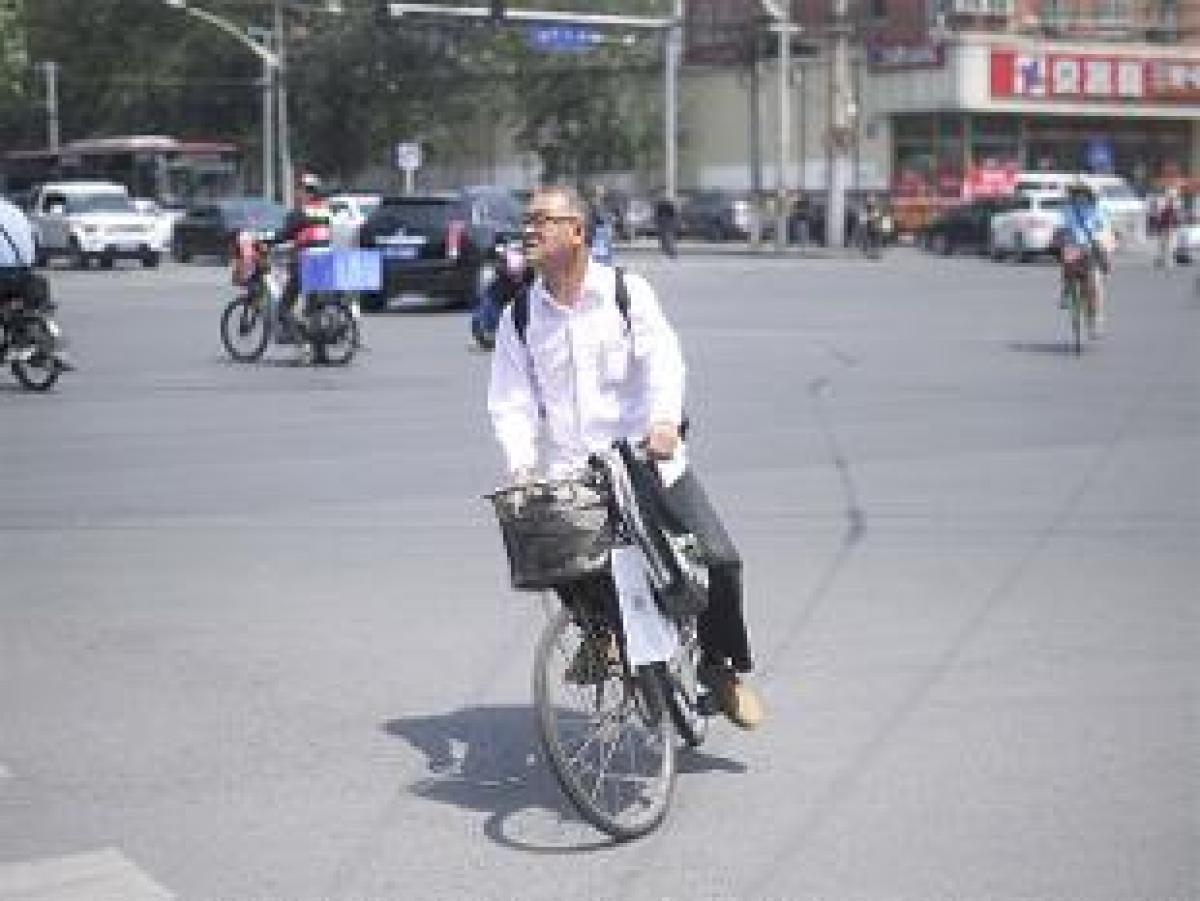Live
- Siddaramaiah has special love for Muslims: BJP
- We can’t afford spending less than 6% of GDP on healthcare
- Guinness World Record for continuous Hanuman Chalisa chanting
- REMOTE TRIBAL AREA TO GET NEW BRIDGE
- Dr LB College, Woxsen teams win in Climate Tank Accelerator event
- CM Revanth petitions for change in Paleru rly line
- Udupi MP seeks more key highways on top priority
- New diet plan rolled out at welfare hostels
- HRF demands for nation-wide caste census
- SP launches Medicover family health card
Just In

Every morning, Gao Ru Lung zigzags on his bicycle between the crawling cars in the maddening traffic of Beijing. After wading through a sea of cars, the 46-year old professor of philosophy reaches the lane for cyclists, only to be honked at by the vehicles that spill on to the reserved lane.
Beijing: Every morning, Gao Ru Lung zigzags on his bicycle between the crawling cars in the maddening traffic of Beijing. After wading through a sea of cars, the 46-year old professor of philosophy reaches the lane for cyclists, only to be honked at by the vehicles that spill on to the reserved lane.
"I feel like kicking the cars parked in bicycles lanes. It's very annoying," said Gao with clenched jaw and tightened fist.
His short commute from a subway station to his college frustrates him. It is the same story for every cyclist who is crying out for space which is shrinking with the swelling number of cars in Beijing, once called "kingdom of bicycles."
In 1986, about 63 percent people pedalled in the streets of Beijing. The number plummeted to 11 percent in 2015, thanks to China's galloping economy which is conspicuous on its roads where cars of every description from Hummer to Lamborghini jostle for space every day.
In the city of around 22 million, 5.6 million cars -- once deemed as a barometer for booming economy -- have added to the woes of Beijing as it battles with deadly air pollution and frightful traffic jams.
Beijing is one of the most polluted cities in the world. Heavy smog engulfs the capital quite often worsened by vehicular pollution.
The rising number of cars, which Beijing is trying to restrict, has forced the cyclists off the dedicated lanes and roads.
China is one of the largest bike producers in the world, but the number of bicycle riders has fallen to some three million, a number much better than Delhi that shares similar concerns of pollution and congestion.
The government is however, gearing up to revive the bike culture in Beijing by sharply increasing the dedicated cycle lanes in the capital.
"Riding bikes was very popular in Beijing. When I was a child Beijing used to have a nickname of 'kingdom of bikes.' With the increasing popularity of private cars and public transport, the number of cyclists is declining sharply," Zhou Tian, deputy director in the decongestion department of the Beijing Municipal Commission of Transport, told IANS.
"But we do know that these bikes can play an important role in reducing pollution. We have decided to make 3,200 kilometre lane for cyclists in Beijing by 2020," Zhou said.
Even though the polluted air and the high number of cars are dissuading factors for bike enthusiasts, many carry the portable and folding bicycles in subway trains.
The public bike sharing system is quite popular in the city. People like to use bicycles for last mile connectivity.
"Riding from the university to subway station is quite convenient, but not beyond. Too much pollution and traffic nowadays," a professor at the China Foreign Affairs University said, requesting that she be not named.
At present, there are some 1,900 bicycle racks in Beijing. Zhou said the government wants to increase their number to 10,000.
Most of them are near subway stations and bus stops.
One can take a bike from these racks by using the government-issued card. The first hour of usage is free.
Zhou admits that the people illegally park their cars in the bicycle lanes.
The rising number of cars has created a problem of parking. Many car owners occupy space in firefighting lanes. Zhou said the government will crack down on such car owners.
"Since riding bike is environment friendly, there is a plan of reviving it. In many European countries, more and more people choose to ride bikes to go out, Zhou said.
Zhang, who owns a bicycle shop in Beijing, laments people buy cycles for exercise, not for commuting, any more. The commuting system will have to go a full circle before Beijing is taken back by pedallers.

© 2024 Hyderabad Media House Limited/The Hans India. All rights reserved. Powered by hocalwire.com







